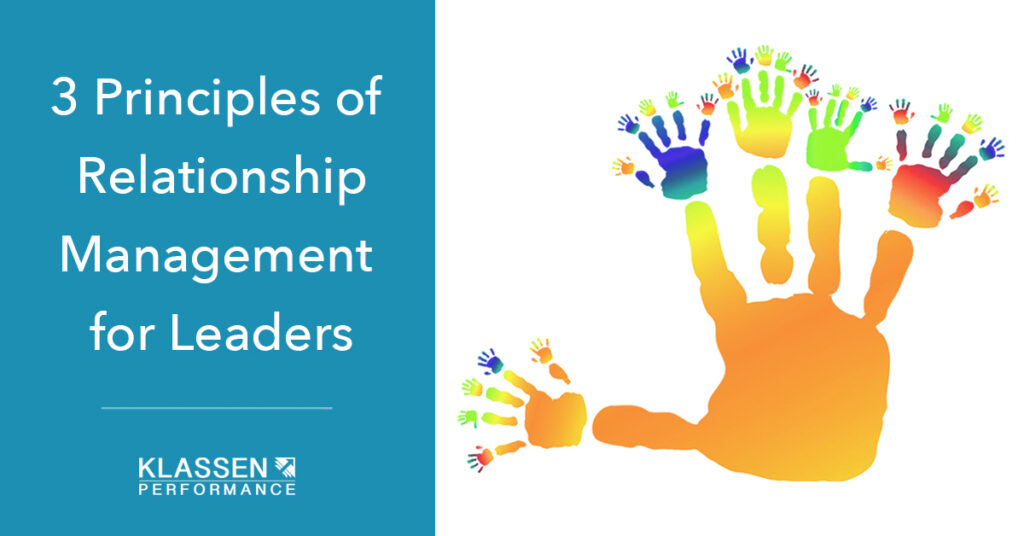
This is Part Five of Six in our series on Emotional Intelligence.
Part 1 – Why it is Essential to Develop Emotional Intelligence
Part 2 – Self-Awareness: The Foundation of Emotional Intelligence
Part 3 – Managing Emotions for Success
Part 4 – 3 Keys to Social Awareness
There are few things that give leaders a better return on their investment than building and nurturing relationships. Relationship management is the 4th characteristic of emotional intelligence in this series.
Leaders need to build relationships within their team, with their direct reports, across teams, and with stakeholders in order to maximize their effectiveness and efficiency. These relationships don’t just happen; they require insight and effort to be mutually beneficial. Emotionally intelligent leaders understand this and prioritize building relationships because they know these relationships are essential to:
- Influencing effectively
- Driving change
- Managing conflict
- Navigating organizational politics
- Collaborating
- Building and nurturing a professional network
- Assembling the best people for projects
Emotions play a role in every interaction you have whether you are aware of them or not. Leaders who identify emotions during an interaction, understand their impact, and respond effectively, work well with and through others to achieve results. This takes a conscious effort and the integration of the three characteristics we addressed in past articles: self-awareness, self-management, and social-awareness.
One very important concept of relationship management is emotional contagion. This is the phenomenon of emotions spreading from one person to another, often without any awareness that it is taking place. Emotionally intelligent leaders know when they are catching emotions from others and consciously choose which emotions others catch from them.
- A leader can use emotional contagion to energize a complacent team and get them moving in the right direction.
- A leader who does not allow the melancholic team member bring him down is actively avoiding catching a negative emotion.
Influencing another person’s emotional state for better or worse is perfectly natural; we do it constantly and automatically. Although we are often unaware it is happening, it significantly impacts our relationships.
The question is, “What emotional impact do you have on others?” When you ask someone for help, do they feel delighted to help or pressured to help? When you assemble a small group to collaborate are people more likely to be enthusiastic or apprehensive?
Keep the words of Maya Angelou in mind…
People will forget what you said; People will forget what you did. But people will never forget how you made them feel.”
– Maya Angelou.
We know that people perform better in a positive, high-energy environment, than in a negatively charged environment. You can positively impact the emotional climate of your organization by consistently applying the three principles below:
1. It is the leader’s responsibility to influence the emotional climate of the organization.
The leader has the greatest impact on the emotional climate of the organization and needs to own this responsibility. People watch leaders constantly and look for clues for how to respond to different situations. Even a small change in the facial expression or tone of voice can trigger emotional contagion and send positive or negative emotions quickly through a team.
A leader who is able to project a calm demeanor in the midst of a crisis is likely to have a team that feels safe and continues to perform. On the other hand, anxiety projected by a leader quickly spreads from one person to the next resulting in a variety of negative outcomes.
What kind of emotions are you spreading through your organization?
2. You have to express the emotion if you want others to catch it
I have worked with leaders who said they are passionate or excited; they just don’t express it. That really isn’t very helpful in the context of using emotional contagion to create a positive, high-energy work place. If a leader is passionate about an idea, but doesn’t express passion as he shares the idea, it is unlikely that listeners will become passionate and buy into it.
We don’t typically express our emotions verbally. We express them through our body language and our tone. Saying you are excited in a flat voice will come off as flat and not energize anyone around the idea. If you want to convey excitement, it is important to look and sound excited. This doesn’t mean jumping up and down, but it is important to have some energy in your voice as well as your face and body.
Are you expressive enough to transfer emotions to others?
3. Expression of positive emotions is powerful
We know that a person’s emotions or mood impacts their productivity. People in good moods are significantly better at solving challenging problems that require insight than people in bad moods. Given that and the fact that the biggest influence on the emotional tone of an organization is the leader, it makes sense for the leader to make a concerted effort to create a positive culture.
Positive emotions originating from the leader bounce around the team and create a positive energy in the workplace. When the leader is able to channel that energy into achieving goals, problem solving, and innovation, everyone benefits. A positive organization is easier to lead and promotes a more open exchange of ideas.
As a leader, some of the positive emotions it is important to put out there are:
- Gratitude
People get energized when they feel appreciated and are more likely to repeat the behavior that elicited the gratitude. A leader who neglects to express gratitude will see a decline in discretionary effort from the team. - Pride
The pride we feel in our work directly impacts our results. It is important that everyone from customer service rep, to sales rep, to regional president has a strong sense of pride in what they do. Because leaders set the emotional tone, the pride starts with you. - Passion
If you are passionate about what you are trying to accomplish, those around you are more likely to get energized and excited and that spills over to the customers. - Optimism
Optimism impacts much of what we do including how we respond to setbacks. Again, as the leader, it is important to model optimism. Setbacks are part of life. You can help your people become more resilient by focusing on what can be done to bounce back rather than how awful the setback is. Doing so not only gets people back on track, it raises the positive energy of the team.
Keep in mind that when it comes to expressing positive emotions, they must be genuine to be transferred. Expressing insincere positive emotions can do more harm than good because people see right through it and it has a negative impact.
How often do you intentionally express genuine positive emotions?
Understanding how emotions spread from person to person is one important component of relationship management. Emotionally intelligent leaders not only understand emotional contagion, but they intentionally use it to create a positive culture and spread the most beneficial emotion for what needs to be accomplished in specific situations. Emotional contagion is just one part of relationship management, but it is a very important part.
If you would like more in-depth information and practice developing emotional intelligence or increasing your ability to influence, contact Dr. Heather Johnson about bringing a course in-house to your team.
 Dr. Heather Johnson is an internationally recognized speaker with extensive experience developing leaders. With a doctorate in Psychology and over 20 years of business experience, she works with leaders to quickly identify individual and team performance obstacles and develops customized solutions that lead to rapid change and lasting results. Heather facilitates public and in-house workshops that deliver personalized, practical, and immediate results. Some of her most requested topics are: Influence, Emotional Intelligence, Team Building, Communication, and Strategic Planning. For more information call contact us here or call 651-210-6021.
Dr. Heather Johnson is an internationally recognized speaker with extensive experience developing leaders. With a doctorate in Psychology and over 20 years of business experience, she works with leaders to quickly identify individual and team performance obstacles and develops customized solutions that lead to rapid change and lasting results. Heather facilitates public and in-house workshops that deliver personalized, practical, and immediate results. Some of her most requested topics are: Influence, Emotional Intelligence, Team Building, Communication, and Strategic Planning. For more information call contact us here or call 651-210-6021.



